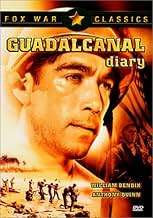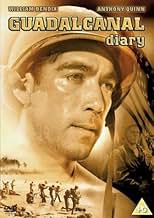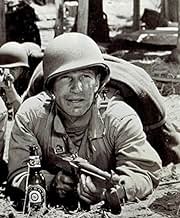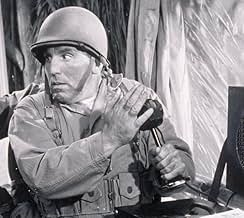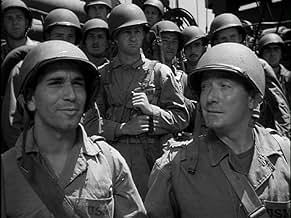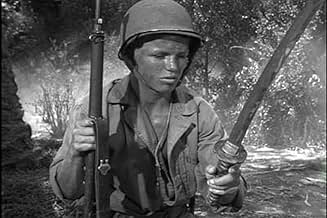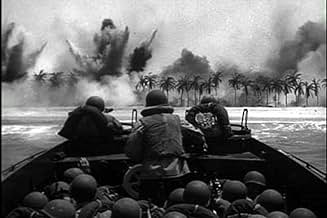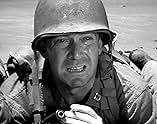AVALIAÇÃO DA IMDb
6,6/10
2,3 mil
SUA AVALIAÇÃO
Adicionar um enredo no seu idiomaThe story of a large U.S. Marines invasion task force bound for Guadalcanal in the Solomon Islands in 1942.The story of a large U.S. Marines invasion task force bound for Guadalcanal in the Solomon Islands in 1942.The story of a large U.S. Marines invasion task force bound for Guadalcanal in the Solomon Islands in 1942.
Eddie Acuff
- Pvt. Tex Mcllvoy
- (não creditado)
Warren Ashe
- Col. Morton
- (não creditado)
Martin Black
- Marine
- (não creditado)
Marion Carl
- Marine Pilot
- (não creditado)
Harry Carter
- Dispatch Officer
- (não creditado)
Tom Dawson
- Captain
- (não creditado)
Enredo
Você sabia?
- CuriosidadesMarine Corps Capt. Marion Carl, a multi-ace (18.5 air victories), makes an appearance as a Marine Corps pilot. Capt. Carl wears his baseball cap with the bill pointed skyward and makes the comment, "Don't look now, fellas, but a truck of gas just came on the field." Capt. Carl was a survivor of the Battle of Midway and the air campaign for Guadalcanal in 1942. He was awarded 2 Navy Crosses for his actions at Midway and Guadalcanal. Sadly, on June 28, 1998, he was murdered in his Oregon home by a home intruder.
- Erros de gravaçãoWhen Japanese snipers hid in the tops of trees, they tied themselves into their positions. They did not fall out of the trees when shot.
- Citações
Cpl. Aloysius T. 'Taxi' Potts: [In dugout waiting out a heavy artillery barrage] I don't mind the one with my name on it. It's the one that says, 'To whom it may concern' that I don't like.
[after the barrage increases]
Cpl. Aloysius T. 'Taxi' Potts: They're throwing everything at us but the kitchen stove.
Gunnery Sgt. Hook Malone: [after an even louder explosion] That's the stove now!
- Cenas durante ou pós-créditosThe film's opening prologue in the preface of a book states: A new chapter in the history of America by a correspondent who landed on Guadalcanal with the first detachment of United States Marines.
- ConexõesEdited into All This and World War II (1976)
- Trilhas sonorasMarine Hymn
(uncredited)
Music by Jacques Offenbach from "Geneviève de Brabant"
Played during the opening credits and occasionally in the score
Avaliação em destaque
Hard hitting war movie about the first land offensive by the US in the Pacific Theater of War. Linking up with a US Navy battle task force in the South Pacific, in late July 1942, a US Marine troop ship gets the word that it's men are to be part of the invasion of the Japanese held Solomon Islands landing at a place called Gudalcanal.
Heading the invasion force is Marine Col.Wallace Grayson, Minor Watson, of the 1st. Marine Div. who's told to expect stiff resistance when his men hit the beach. As D-Day, August 7, 1942, approaches there's an eerie feeling among the Marines on deck that this first land battle is going to be a lot different then any thing that they could possibly imagined, they were right.
Powerhouse cast headed by Marine Chaplin Father Donnelly, Preston Foster, with tough as nails Marine Sgt. Hook Malone, Llyod Noland, and young 17 year old Richard Jackel as the baby-face and non-shaving Pvt. Johnny "Chicken" Anderson storm ashore on Gaudalcanal only to find that the Japanese are nowhere to be found and the "stiff resistance" that they expected was almost non-existent. Caught off guard and by surprise the Japanese defenders took off in the jungles and caves on the island. It's there that they waited to be reinforces by fresh Nippon army and marine units from the neighboring Japanese-held islands of Rabaul and Bouganinvillea.
With the US Marines capturing the Japanese air-field on the island, renaming it Henderson Field, and having much needed supplies flown in everything look up for the leathernecks and the battle of Guadalcanal seems just about over. The truth later turned out to be that the battle only began and would last some eight months. In the end Gaudalcanal would cost the US Marines Army and Navy some 20,000 casualties by the time it was over.
Far more realistic then most of the movies made by Hollywood in WWII about WWII "Guadalcanal Diary" keeps the action up and the the false heroics down. Making the Marines in the movie more human with real emotions and feeling about surviving the battle and coming back home when the war's finally over.
We also see the Japanese as both tough and effective, as well as cunning,soldiers not the wild-eyed and mindless fanatics were used to seeing, in the many war movies released back then. Thus giving the American public a better idea of what the men in both the US Marines and Army were fighting in the war in the Pacific.
The US Marines at first being told by a captured Japanese soldier that his unit is ready to surrender send a patrol to the off-shore island village of Matanikau only to find that the Japanese troops waiting for them. In an ambush the Japanese wiped out the entire Marine patrol, including it's commanding officer Capt. Cross ,Roy Roberts. Cpt. Alvarez, Anthony Quinn, was the only survivor who escapes by swimming out at sea. It now becomes apparent that the Japanese are not giving up that easily and the Maines dig in for the major battles that are soon to come.
In a tough sea air and land campaign the US and Japanese forces slug it out as the Japanese Navy tries to cut off reinforcements to the Marines on the Island. Leaving them isolated and sitting ducks for their massive naval and air attacks. The fighting goes on unabated until the US finally breaks through the Japanese blockade. As new Army as well as Marine unites land on the Island, and on Novermber 11, 1942 launch a major counter-attack that clears Gudalcanal of Japanese troops. The Japanese, unlike in the movie, were successfully evacuated by sea not massacred on the beaches by the Marines and GI's. Still the battle of Gudalcanal was the first of many Japanese held island taken by US forces that eventually lead to the defeat of Japan in the late summer of 1945.
With all the action and heroics in the movie the most moving scene in the film is when the Marines, underground in their bunker, are being hit by a nerve wracking and murderous Japanese naval and air bombardment. The Marines acted like you would expect to act under the same circumstances, scared and afraid. Cpl. Aloysius "Taxi" Potts, William Bendix, put it best when he says "I'm no hero I'm just a guy I've come out her because somebody had to come, I don't want no medals I just want to get this over with and go back home".
Heading the invasion force is Marine Col.Wallace Grayson, Minor Watson, of the 1st. Marine Div. who's told to expect stiff resistance when his men hit the beach. As D-Day, August 7, 1942, approaches there's an eerie feeling among the Marines on deck that this first land battle is going to be a lot different then any thing that they could possibly imagined, they were right.
Powerhouse cast headed by Marine Chaplin Father Donnelly, Preston Foster, with tough as nails Marine Sgt. Hook Malone, Llyod Noland, and young 17 year old Richard Jackel as the baby-face and non-shaving Pvt. Johnny "Chicken" Anderson storm ashore on Gaudalcanal only to find that the Japanese are nowhere to be found and the "stiff resistance" that they expected was almost non-existent. Caught off guard and by surprise the Japanese defenders took off in the jungles and caves on the island. It's there that they waited to be reinforces by fresh Nippon army and marine units from the neighboring Japanese-held islands of Rabaul and Bouganinvillea.
With the US Marines capturing the Japanese air-field on the island, renaming it Henderson Field, and having much needed supplies flown in everything look up for the leathernecks and the battle of Guadalcanal seems just about over. The truth later turned out to be that the battle only began and would last some eight months. In the end Gaudalcanal would cost the US Marines Army and Navy some 20,000 casualties by the time it was over.
Far more realistic then most of the movies made by Hollywood in WWII about WWII "Guadalcanal Diary" keeps the action up and the the false heroics down. Making the Marines in the movie more human with real emotions and feeling about surviving the battle and coming back home when the war's finally over.
We also see the Japanese as both tough and effective, as well as cunning,soldiers not the wild-eyed and mindless fanatics were used to seeing, in the many war movies released back then. Thus giving the American public a better idea of what the men in both the US Marines and Army were fighting in the war in the Pacific.
The US Marines at first being told by a captured Japanese soldier that his unit is ready to surrender send a patrol to the off-shore island village of Matanikau only to find that the Japanese troops waiting for them. In an ambush the Japanese wiped out the entire Marine patrol, including it's commanding officer Capt. Cross ,Roy Roberts. Cpt. Alvarez, Anthony Quinn, was the only survivor who escapes by swimming out at sea. It now becomes apparent that the Japanese are not giving up that easily and the Maines dig in for the major battles that are soon to come.
In a tough sea air and land campaign the US and Japanese forces slug it out as the Japanese Navy tries to cut off reinforcements to the Marines on the Island. Leaving them isolated and sitting ducks for their massive naval and air attacks. The fighting goes on unabated until the US finally breaks through the Japanese blockade. As new Army as well as Marine unites land on the Island, and on Novermber 11, 1942 launch a major counter-attack that clears Gudalcanal of Japanese troops. The Japanese, unlike in the movie, were successfully evacuated by sea not massacred on the beaches by the Marines and GI's. Still the battle of Gudalcanal was the first of many Japanese held island taken by US forces that eventually lead to the defeat of Japan in the late summer of 1945.
With all the action and heroics in the movie the most moving scene in the film is when the Marines, underground in their bunker, are being hit by a nerve wracking and murderous Japanese naval and air bombardment. The Marines acted like you would expect to act under the same circumstances, scared and afraid. Cpl. Aloysius "Taxi" Potts, William Bendix, put it best when he says "I'm no hero I'm just a guy I've come out her because somebody had to come, I don't want no medals I just want to get this over with and go back home".
- sol-kay
- 12 de nov. de 2005
- Link permanente
Principais escolhas
Faça login para avaliar e ver a lista de recomendações personalizadas
- How long is Guadalcanal Diary?Fornecido pela Alexa
Detalhes
- Data de lançamento
- País de origem
- Idioma
- Também conhecido como
- O Diário de Guadalcanal
- Locações de filme
- Empresa de produção
- Consulte mais créditos da empresa na IMDbPro
- Tempo de duração1 hora 33 minutos
- Cor
- Proporção
- 1.37 : 1
Contribua para esta página
Sugerir uma alteração ou adicionar conteúdo ausente



